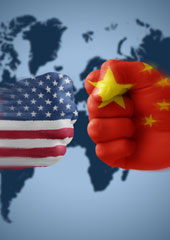America’s Consumer Democracy Versus China’s Modern Mandarinate
Are the consumer democracies of the West becoming ungovernable, while authoritarian China moves into the future?
February 27, 2013

One of the most stunning facts of global life today is that China is investing heavily in its infrastructure — and hence the future — much like California and the United States of America did 50 years ago.
China is building bullet trains that will link 80% of the population, expansive subway systems beneath its megacities and a university system modeled on the Golden State’s. China has also taken the lead in solar and many other renewable energy technologies, a field once owned by California, the most environmentally sensitive of all U.S. states.
None of this is to say that China doesn’t have serious problems — or that America doesn’t have great strengths. It is to say that governance matters in whether a state or nation advances or regresses.
And it does raise another pivotal issue: Are the fragmented and indebted consumer democracies of the West, hobbled by their short-term cultural habits and political horizons, becoming ungovernable, while the united, farsighted leadership of authoritarian China, despite immense challenges, is moving that country boldly and decisively into the future?
The United States has turned into a borrower and consumer-driven economy dominated by the financial sector and services industry and a country where inequality has grown dramatically. In contrast, China is an investor and export-driven economy that is still industrializing, still largely impoverished and sharply unequal.
This contrasting dynamic between two clashing systems has generated an imbalance in the global economy that, if not corrected, threatens the peace and prosperity that has so far been achieved through globalization.
The correction that is required cannot be economic alone. It depends as well on the recalibration of political systems in both the West and the East. Sustained balance can be accomplished only by undoing the way American and Chinese inequalities have played off of each other.
To date, the world is witnessing a strange dance between a low-wage, export-led economy that is piling up huge reserves from the overconsumption habits of an American middle class that fills the gap in its falling status through borrowing. All of this is fuelled on by an ever-accommodating Federal Reserve and interest rates pushed to unprecedented low levels on the back of plenty of liquidity provided by China.
Good global governance means finding a way to effect a decisive move away from this precarious state of affairs.
Americans should ask themselves this question: Where will their country be two decades from now if they do not find a way to break out of the paralysis that is leading them from an era of promise to a trajectory of demise?
California may be the proverbial canary in the coalmine. Every college freshman, entrepreneur, homeowner, new immigrant or retiree there has shared the sinking feeling that the future the state that was once so famously said to be ahead globally is now being passed by.
In fact, daunting deficits after years of political gridlock have turned California in the minds of many into the epitome of the crisis of democratic governance that is spreading across the West from Athens to Washington.
China’s modern mandarinate
China, too, has its work cut out for itself. It needs a recalibration of the political system to enable a freer press to monitor government performance, supplementing the participatory power of that country’s active webocracy.
To safeguard its own tremendous future potential, China also needs a decisive move toward institutionalization of the rule of law through an independent judiciary. And it has to move toward broader electoral accountability in order to check the abuse of power by local political bosses, developers or factory owners.
With a one-party state and routine repression, China is certainly not an open society and still has a long way to go from rule-by-law to rule-of-law. But the door is considerably more ajar than most in the West perceive.
Singapore’s George Yeo is undoubtedly correct when he says that China’s “modern-day mandarinate” at the national level is largely meritocratic and geared to the common advance of the Chinese nation as a whole.
However, the great challenge, as China seeks to negotiate a middle-income transition like its modernized neighbors, is this: Can the one-party mandarinate, which has competently moved the Middle Kingdom from a peasant economy to the factory of the world, transcend its Maoist roots and respond to the new conditions and constituencies it is creating?
In their own ways, the city-states of Singapore and Hong Kong have shown China a path forward. While maintaining its strong meritocratic bias in governance, Singapore has loosened up considerably in recent years as a cosmopolitan hub of the global economy.
Singapore’s government consistently aims at the betterment of its citizens, vigilantly monitoring corruption, while keeping open channels of participation, even if those are still short of robust, multi-party competition. Unlike in China, Singapore allows open political competition through social media.
Meanwhile, Hong Kong — though part of China — has so far kept the rights of freedom of speech and assembly bequeathed by British rule. It filters direct popular rule through a legislative council that is partially apportioned to functional constituencies.
To be sure, this system falls short of the democratic aspirations of Hong Kongers who want to move to universal suffrage by 2017. Yet, carefully calibrated as it presently is, it would be a big step forward if adopted by Beijing.
The Chinese mandarinate is already being tested on many fronts. It needs to stimulate domestic consumption as American and European demand for Chinese exports weakens.
And it urgently needs to respond credibly to endemic environmental crisis as well as very real social risks. The latter range from the striking workers at Honda and the 2009 suicides at the Foxconn factory that makes the iPod to the widely reported village revolt in Wukan in 2011.
In some ways, the old guard that is still a key part of China’s leadership — and which still erroneously believes that propaganda is possible in the glass house of the information age — is the mandarinate’s worst enemy.
The Chinese Communist Party’s legitimacy is based upon performance, internally and externally. This creates a kind of systemic accountability.
Yet, when performance fails — such as after the Sichuan earthquake, when schools collapsed because of shoddy construction allowed through corrupt permit practices — old instincts still prevail.
But any effort to cover up the situation, instead of admitting the problem outright and fixing it, is futile. Through microblogging, the true state of affairs is common knowledge. The resultant lack of trust among the public means that many just don’t believe any government information any more — even when it is true.
What side of history the American or Chinese systems end up on will depend on governance. The United States remains paralyzed by an endless debate over how much government it wants and what its role is, though its political class remains ideologically rigid with respect to its commitment to liberal democracy as the best system ever invented by humanity.
The Chinese don’t much question the economic or social role of the state, but are instead engaged in an intensive and wide-ranging debate over how much authoritarian meritocracy China needs versus how much democracy it can afford and still maintain “harmony” and stability.
From the village level to the leadership compound of Zhongnanhai, discussions swirl — mostly privately but some publicly — over whether, and at what level, different models can be pragmatically accommodated.
Editor’s note: This article is adapted from Intelligent Governance for the 21st Century: A Middle Way Between West and East (Polity Press) by Nicolas Berggruen and Nathan Gardels. Published by arrangement with the authors and Polity Press. Copyright © 2013 by Nicolas Berggruen and Nathan Gardels.
Takeaways
The contrasting dynamic between the United States and China has generated an imbalance in the global economy.
America is a borrower and consumer economy, while China is an investor and export-driven economy.
If not corrected, the clashing approaches of the world's two superpowers threaten the prosperity that has so far been achieved through globalization.
Sustained balance can be accomplished only by undoing the way American and Chinese inequalities have played off of each other so far.
Read previous
How Countries Compare on Corruption
February 26, 2013
